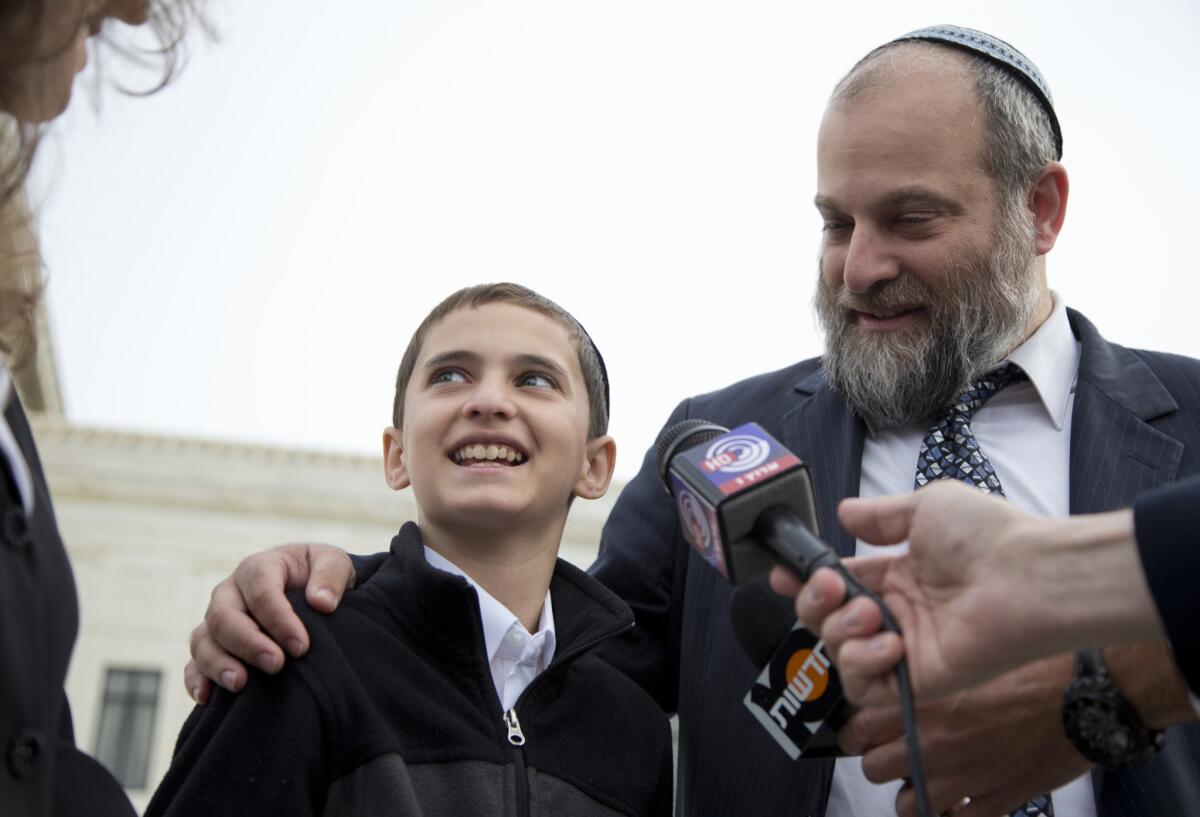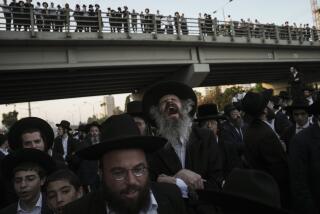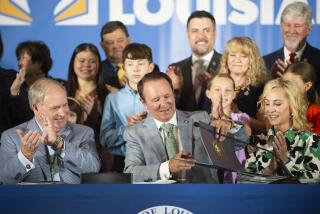From the Archives: Divided on Jerusalem

Menachem Zivotofsky and his father Ari Zivotofsky speak to media outside the Supreme Court in Washington on Nov. 3, 2014. The Supreme Court has struck down a disputed law that would have allowed Americans born in Jerusalem to list their birthplace as Israel on their U.S. passports.
On Monday, the U.S. Supreme Court sided with the Obama administration in a case involving a Jerusalem-born boy and his parents who wanted to take advantage of a 2002 law that allows Israel to be listed as the country of birth on the passport of a child born in Jerusalem. In 2011, when the high could first agreed to hear the case, editorial page editor Nick Goldberg wrote about what the dispute meant for his son who was born in Jerusalem.
When our youngest son was born in Jerusalem in 1995, a number of questions faced us. First was whether we should accept Israeli citizenship for him, which would grant him a second passport and the ability to work (and take refuge, if necessary) in a foreign land — but which would come with a military service requirement in a country that wouldn’t really be his home. We opted against it. Then there was the less pressing question of whether our newborn son could become president of the United States despite some ambiguity about whether he was a “natural-born citizen,” as required by Article II of the U.S. Constitution. The consensus was that as the child of two American citizens, he could.
Now, 16 years later, there’s a new issue for us (and him) to think about. On Monday, the U.S. Supreme Court heard the case of Menachem B. Zivotofsky, a 9-year-old American citizen who, like my son, was born in Jerusalem. Zivotofsky (and his parents and his lawyers) are upset because his American passport — like my son’s — doesn’t specify a country of birth, just a city. My son’s passport records his birthplace merely as “Jerusalem,” unlike the passport of an American child who was born in “Paris, France” or “Beijing, China.”
That’s because the U.S. has opted not to take a position on the deeply controversial question of whose city Jerusalem really is. In the 19th century, it was part of the Ottoman Empire. After World War I, the British took control. Under the partition agreement devised by the United Nations in the mid-1940s, Jerusalem was supposed to be placed under international rule, but after the 1948 war, it emerged divided, with Jordan occupying the Old City and East Jerusalem and Israel in charge in the west. The 1967 Arab-Israeli War shifted power yet again: The Israelis took the entire city, reunified it and declared it their “eternal” capital — a situation Palestinians insist is nothing less than an illegal occupation.
Successive U.S. administrations have tried to stay neutral, arguing that the city’s final status must be determined in negotiations between Israelis and Palestinians. But Congress feels differently; in addition to calling on the president to move the U.S. Embassy from Tel Aviv to Jerusalem, it passed a law in 2002 saying that passports of American citizens born in Jerusalem should “record the place of birth as Israel” if the parents request it. The Supreme Court is now being asked to decide between Congress’ law, the administration’s vehement claim that it alone should make such foreign policy decisions, and the court’s own desire not to become entangled in “political” issues.
For my son — when the news of the Zivotofsky case was broadcast on NPR during carpool — it served, I hope, as a reminder of his place in the broader world, and of the way in which one’s personal story can be distantly connected to a giant, raging battle on the other side of the planet. For me and my wife, it was another reminder of the battered, disputed city we once lived in, a city of Palestinians and Israelis, of Christians, Jews and Muslims, of checkpoints and bombings, of ancient beauty and religious passion and historic complexity, over which so many people have understandably been fighting for 3,000 years.
Follow the Opinion section on Twitter @latimesopinion and Facebook
More to Read
A cure for the common opinion
Get thought-provoking perspectives with our weekly newsletter.
You may occasionally receive promotional content from the Los Angeles Times.











